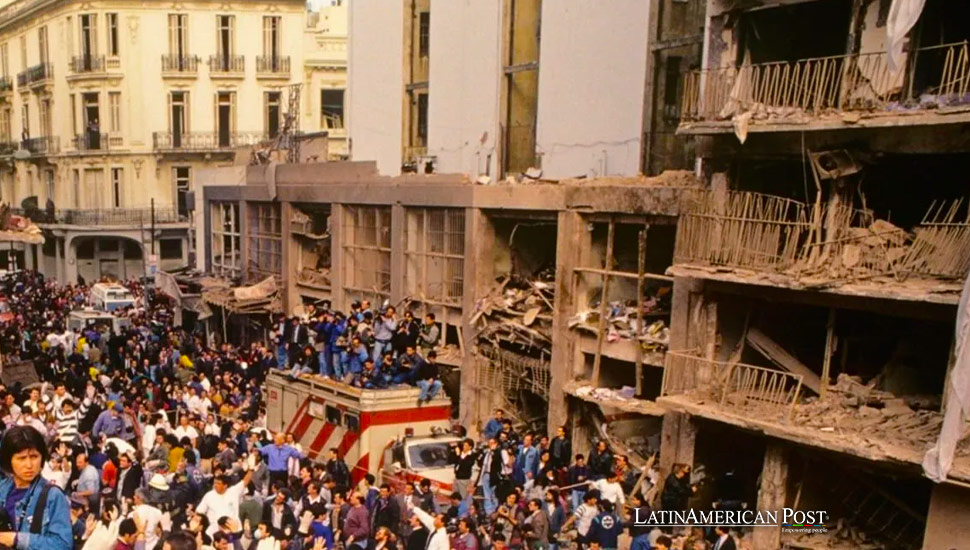Inter-American Court Condemns Argentina for AMIA Bombing Failures

The Inter-American Court of Human Rights has condemned Argentina for its failure to investigate the 1994 AMIA bombing adequately, which resulted in 85 deaths and severe injuries to 151 people. The ruling mandates various reparations and transparency measures.
In a landmark decision, the Inter-American Court of Human Rights (IACHR) condemned the Argentine government for its responsibility and lack of proper investigation regarding the terrorist attack on the Argentine Israelite Mutual Association (AMIA) headquarters on July 18, 1994. The bombing led to 85 fatalities and inflicted severe injuries on 151 individuals. This ruling underscores the state’s accountability and mandates comprehensive measures for justice and reparation.
The court’s president, Nancy Hernández, announced the verdict to the involved parties, highlighting that Argentina had acknowledged its full responsibility during the proceedings. Despite this admission, the international tribunal issued a formal judgment and specified various reparation measures to address the failures and harms caused.
The IACHR found that Argentina failed to take reasonable measures to prevent the attack despite being aware of the significant risk to Jewish community sites. The court criticized the state for not fulfilling its duty to investigate the attack and its subsequent cover-up diligently and for denying victims’ families real access to relevant documentation.
“The State was aware of a real and immediate risk to sites identified with the Jewish community and did not adopt reasonable measures to mitigate that risk,” the ruling stated.
The court concluded that the Argentine state is accountable for violations of the rights to life, personal integrity, equality, non-discrimination, access to justice, judicial guarantees, the right to information, the right to truth, and the psychic and moral integrity of the victims and their families.
“The State’s failure to properly investigate one of the largest terrorist attacks in the region’s history is a grave breach of its duty. These failures in due diligence led to mishandling of evidence and the crime scene, as well as poor investigation management,” the ruling emphasized.
Obstacles to Justice
The judgment also detailed the state agents’ actions aimed at obstructing the investigation and covering up the actual perpetrators, who remain unidentified and unpunished to this day. The IACHR ordered the Argentine government to “remove all obstacles that maintain total impunity in this case and initiate, continue, or reopen necessary investigations.”
In addition to ensuring justice, Argentina must conduct a public act of acknowledgment of its responsibility, produce a documentary on the incident, and create a public historical archive detailing the attack, investigation, cover-up, and the role of victim associations.
The IACHR also mandated that the state regulate the judicial use of intelligence information, develop training programs on its application, and provide victims and their legal representatives with full access to all investigations and information related to the attack and its cover-up.
This ruling has significant implications not only for Argentina but also for the broader Latin American context, where many countries grapple with similar issues of state accountability and justice for victims of violence. The AMIA bombing remains one of the most severe terrorist attacks in the region’s history, highlighting the need for rigorous standards of investigation and transparency.
Latin America has a history of state-sanctioned impunity and corruption, which often hampers justice for victims of violence. The IACHR’s condemnation of Argentina sets a critical precedent, emphasizing the importance of state responsibility in protecting citizens and ensuring thorough investigations of crimes. This decision sends a powerful message to other countries in the region about the necessity of upholding human rights and the rule of law.
Countries like Mexico, Colombia, and Brazil, which face ongoing challenges related to violence, corruption, and impunity, can draw important lessons from this ruling. It underscores the need for robust legal frameworks, independent judiciary systems, and mechanisms for transparency and accountability to protect human rights effectively.
Steps Towards Reparation and Transparency
The court’s ruling also detailed specific measures that Argentina must undertake to rectify its failures. These include creating a centralized physical space for all archives related to the AMIA case, ensuring their proper preservation, and establishing an area dedicated to analyzing declassified intelligence information.
The IACHR further ordered Argentina to provide compensatory damages to the victims and their families for both material and immaterial harm. These reparations are critical in acknowledging the suffering endured by the victims and their loved ones and in restoring some measure of justice.
Additionally, the state must regulate the incorporation of intelligence information as judicial evidence and develop a training program on its use. This includes granting victims and plaintiffs full access to all investigations and related information. By centralizing these efforts and making information accessible, Argentina can begin to address the historical injustices related to the AMIA bombing.
The IACHR’s condemnation of Argentina for its handling of the AMIA bombing is a pivotal moment for human rights and justice in Latin America. It highlights the enduring need for states to take proactive measures in preventing violence, ensuring thorough and impartial investigations, and upholding the rights of victims and their families.
Also read: Argentine Police Dismantle International Credit and Debit Card Fraud Network
As Argentina moves forward with the court’s mandates, it sets a powerful example for other Latin American countries facing similar challenges. The ruling reinforces the importance of transparency, accountability, and reparative justice as essential components of a fair and just society.
The broader impact of this ruling extends beyond Argentina’s borders, offering a blueprint for how states can and should respond to acts of violence and terrorism. By adhering to these principles, Latin American countries can work towards a future where human rights are respected and justice is accessible.





